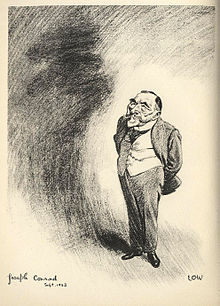
L. Robson, Joseph Conrad's Journey - Was the novelist right to think everyone was getting him wrong?
Leo Robson, Joseph Conrad's Journey - Was the novelist right to think everyone was getting him wrong?
Article paru sur le site du New Yorker, novembre 2017.
"In March, 1893, John Galsworthy—a product of Harrow and Oxford who had recently passed the English bar exam—was boarding the passenger ship Torrens, in Port Adelaide, when he noticed a small man with black hair boisterously loading cargo. In a letter home, a month into the voyage, he described “a capital chap,” Polish, somewhat odd-looking, with “a fund of yarns on which I draw freely.” Galsworthy’s sister credited this encounter with turning him away from the law. By early 1897, Galsworthy had assembled a book of short stories, and his Polish friend, who had engineered a midlife career change of his own from British seaman to English novelist, under the name Joseph Conrad, was writing to Edward Garnett, who worked as a publisher’s reader—a sort of grand scout—asking him to look out for a manuscript by “my literary! friend.”
Mostly, though, the favors travelled in the other direction. For the next couple of decades, Galsworthy served as Conrad’s consigliere—lobbying the Royal Literary Fund (“No living writer of English, to my mind, better deserves support”), fielding Conrad’s queries about his son’s education (“I am sending you the prospectus to look at”), playing “ ‘in between’ man” during a dispute with the agent J. B. Pinker (“Conrad asks me to ask you to write to him”). One of Galsworthy’s greatest acts of service came in 1913, after the publisher Frank Nelson Doubleday invited Conrad to lunch, in London, and proposed purchasing his existing American copyrights and reprinting his books. Conrad welcomed the idea, but, fearing it wouldn’t come off, asked Galsworthy if he could write to his friend Alfred A. Knopf, the Doubleday, Page employee who, in Conrad’s words, had formulated “this plan of ‘taking me up.’ ”
Knopf was twenty years old and brimming with ideas for remedying the outrage that “a great writer” could fail to command “a large audience.” Among his promotional schemes was an illustrated pamphlet, a press release parading as an essay. On receiving word from Galsworthy, he sent Conrad an effusive letter along with an aging, error-strewn ten-page typescript entitled “Joseph Conrad,” which he had found somewhere and was gutting for information. (...)"